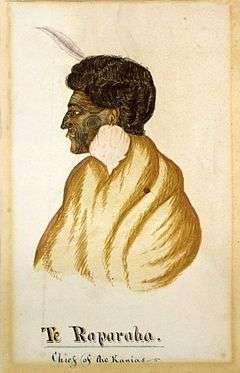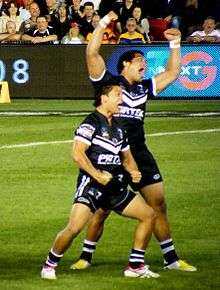Ka Mate

"Ka Mate" is a Māori haka composed by Te Rauparaha, war leader of the Ngāti Toa tribe of the North Island of New Zealand.
Composition
|
|
Te Rauparaha composed "Ka Mate" circa 1820 as a celebration of life over death after his lucky escape from pursuing Ngāti Maniapoto and Waikato enemies.[1][2] He had hidden from them in a food-storage pit, and climbed back into the light to be met by a chief friendly to him – Te Whareangi (the "hairy man").
The haka as composed by Te Rauparaha begins with a chant:[1][2]
Kikiki kakaka kauana!
Kei waniwania taku tara
Kei tarawahia, kei te rua i te kerokero!
He pounga rahui te uira ka rarapa;
Ketekete kau ana to peru kairiri
Mau au e koro e – Hi! Ha!
Ka wehi au ka matakana,
Ko wai te tangata kia rere ure?
Tirohanga ngā rua rerarera
Ngā rua kuri kakanui i raro! Aha ha!
Then follows the main body of the haka:
Ka mate, ka mate! ka ora! ka ora! |
'Tis death! 'tis death! (or: I may die) ’Tis life! ‘tis life! (or: I may live) |
Use in rugby

"Ka Mate" is the most widely known haka in New Zealand and elsewhere because it has traditionally been performed by the All Blacks, New Zealand's international rugby union team, as well as the Kiwis, New Zealand's international rugby league team, immediately prior to test (international) matches. Since 2005 the All Blacks have occasionally performed another haka, "Kapa o Pango". Since the introduction of "Kapa o Pango" the longest sequence of "Ka Mate" performances by the All Blacks is nine, which occurred between 22 August 2009 and 12 June 2010.
Ownership
Between 1998 and 2006, Ngati Toa attempted to trademark "Ka Mate" to prevent its use by commercial organisations without their permission.[3][4] In 2006 the Intellectual Property Office of New Zealand declined their claim on the grounds that "Ka Mate" had achieved wide recognition in New Zealand and abroad as representing New Zealand as a whole and not a particular trader. In March 2011 The NZ Rugby Union came to an amicable agreement with the iwi not to bring the mana of the haka into disrepute.[5]
In 2009, as a part of a wider settlement of grievances, the New Zealand government agreed to:
- "...record the authorship and significance of the haka Ka Mate to Ngāti Toa and ... work with Ngāti Toa to address their concerns with the haka... [but] does not expect that redress will result in royalties for the use of Ka Mate or provide Ngāti Toa with a veto on the performance of Ka Mate...".[6][7]
See also
- Haka (sports)
- Haka in popular culture
- Kapa haka
- List of New Zealand rugby union haka performances – since "Kapa o Pango" was introduced in 2005
- Māori music
References
- 1 2 Pōmare, Mīria (12 February 2014). "Ngāti Toarangatira – Chant composed by Te Rauparaha". Te Ara – the Encyclopedia of New Zealand. Ministry for Culture & Heritage. Retrieved 31 August 2015.
- 1 2 "Haka Ka Mate Attribution Act 2014 Guidelines" (PDF). Ministry of Business, Innovation & Employment. Archived from the original (pdf) on 23 January 2016. Retrieved 31 August 2015.
- ↑ "All Blacks fight to keep haka". news.bbc.co.uk. 16 July 2000. Retrieved 3 May 2008.
- ↑ "Iwi threatens to place trademark on All Black haka". New Zealand Herald. 22 May 2005. Retrieved 3 May 2008.
- ↑ "Iwi claim to All Black haka turned down". New Zealand Herald. 2 July 2007. Retrieved 3 May 2008.
- ↑ Ngāti Toa Rangatira Letter of Agreement Archived 21 May 2010 at the Wayback Machine.
- ↑ "New Zealand Maori win haka fight". BBC News. 11 February 2009.
External links
| Wikisource has original text related to this article: |
- The story behind "Ka Mate" – includes a recording
- Another and different translation of haka – tells the meaning behind the translation
- Ancient versions of Ka Mate – A comparative study of "Ka Mate" from ten different sources.